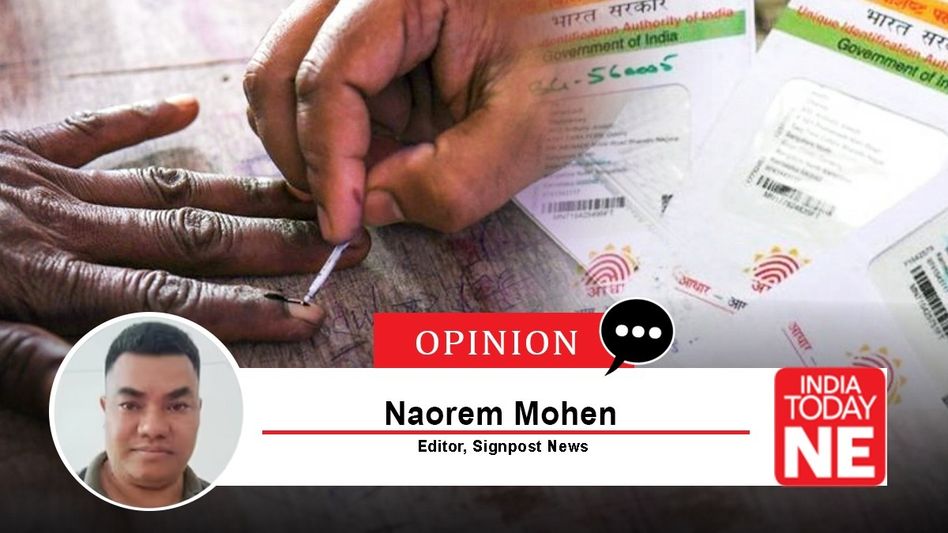Fake Voters, Aadhaar Cards and a Flawed 2001 Census Threaten 2026 Delimitation in Manipur
As Manipur approaches its 2027 state election and the pivotal 2026 delimitation process, it confronts an existential threat to its democratic framework: the infiltration of over 1.3 lakh fake voters into its electoral rolls, as reported by the Manipur Pradesh Congress Committee (MPCC) in March 2023.

As Manipur approaches its 2027 state election and the pivotal 2026 delimitation process, it confronts an existential threat to its democratic framework: the infiltration of over 1.3 lakh fake voters into its electoral rolls, as reported by the Manipur Pradesh Congress Committee (MPCC) in March 2023. This staggering figure, coupled with systemic vulnerabilities and the state’s porous borders, endangers the integrity of its elections and risks distorting the delimitation process, which will redraw constituency boundaries based on population data.
Despite efforts under former Chief Minister N Biren Singh to purge more than 75,000 fraudulent entries between 2017 and 2022, the crisis—now persisting for over two years—continues to undermine the democratic rights of Manipur’s indigenous communities. With the 2001 census, tainted by abnormal population growth, still looming as a potential basis for delimitation, the state stands at a crossroads. Urgent, comprehensive action is needed to safeguard Manipur’s political future and ensure that only genuine citizens shape its governance.
The extent of electoral fraud in Manipur is nothing short of alarming. During N Biren Singh’s tenure as Chief Minister from 2017 to 2022, the Election Commission of India’s (ECI) Elector Verification Programme identified and removed over 75,000 fake voters. In one district alone, 24,636 fraudulent entries were deleted, while 282 deserted hamlets were flagged for exclusion from MGNREGS benefits due to their non-existence.
N Biren Singh, visibly frustrated by the scale of the issue, remarked, “Without sincerity, a sense of ownership, and care for our state, unrest will persist, and our democracy will suffer.” His administration launched aggressive measures to curb the problem, including operations in the border town of Moreh, where authorities arrested individuals forging voter IDs and other documents. In 2021 and 2024, the Border Security Force (BSF) and Central Reserve Police Force (CRPF) seized hundreds of fake IDs, exposing organised rackets exploiting Manipur’s vulnerabilities.
Further efforts included a 2020 pilot program in Imphal West and Thoubal, which cross-verified voter IDs against ration cards, successfully removing ineligible voters. The Inner Line Permit (ILP) system, introduced to restrict non-locals from settling in Manipur, closed critical loopholes in voter enrollment. Public awareness campaigns ensured that genuine voters were not inadvertently disenfranchised during these purges. However, systemic issues persist. A 2018 report highlighted 136 untraceable villages in Chandel district, alongside 7,038 fake pensioners, pointing to gross administrative negligence. These lapses allowed fraudulent entries to proliferate, threatening the fairness of elections and the accuracy of the upcoming delimitation.
Manipur’s electoral crisis is deeply intertwined with its geopolitical challenges, particularly its 398-kilometre porous border with Myanmar. The Free Movement Regime (FMR), which permits visa-free travel up to 16 kilometres across the border, has facilitated waves of illegal immigration from Myanmar and, more recently, Bangladesh since the 1950s. With a population of just 34 lakh and only three Members of Parliament, Manipur is acutely vulnerable to demographic shifts. Indigenous groups, including the Meetei (Meitei) Tribe Union, have accused both central and state authorities of enabling a “systematic demographic invasion” that threatens the cultural and political survival of native communities. Reports from Jiribam reveal Bangladeshi immigrants blending into local populations, while a cabinet subcommittee formed on February 16, 2023, identified over 2,480 illegal immigrants in Chandel and Tengnoupal districts. Indigenous groups argue that these figures represent only a fraction of the true scale, with unauthorised settlements sprawling in border areas like Churachandpur, Kamjong, and Jiribam.
The violence that erupted in May 2023, displacing thousands and claiming over 300 lives, further complicated efforts to monitor immigration. The unrest disrupted biometric verification initiatives, allowing illegal settlements to expand without oversight. These settlements, often constructed without legal scrutiny, hint at a calculated effort to alter voter demographics and tilt political power toward migrant-backed interests. Historical patterns exacerbate the crisis: Burmese refugees arrived in 1973, Kuki insurgents were rehabilitated and signed a Suspension of Operation (SoO) in 2008, and recent inflows of Chin-Kuki refugees have continued under the guise of humanitarian support. These movements have disproportionately affected tribal-dominated hill districts, rapidly altering the state's demographic balance.
The convergence of fake Aadhaar cards, fraudulent voter IDs, and anomalies in the 2001 census creates a perilous loophole. Illegal immigrants, equipped with falsified documents, can be mistaken for legitimate citizens, potentially gaining full civic rights, including the ability to vote and contest elections. The MPCC’s claim of 1.3 lakh fake voters indicates the scale of this threat, with undetected entries risking inclusion in census data, erroneously legitimising non-citizens. This could profoundly distort the 2026 delimitation, inflating constituency boundaries and marginalising indigenous communities.
The 2001 census, rescinded by the High Court in 2008 due to implausible population growth rates (up to 267% in subdivisions like Tengnoupal, Churachandpur, and Kamjong), remains a contested basis for delimitation under the Delimitation Act 2002. MPCC vice-president Hareshwar Goswami has rejected its use, calling it “conspicuously faulty,” while BJP MLA Rajkumar Imo Singh urged Union Home Minister Amit Shah to implement the National Register of Citizens (NRC) and eliminate fake voters before delimitation.
Manipur census data in the last twenty years have reported abnormal population growth in hill districts, widely attributed to illegal immigration. These distortions are believed to favour migrant-dominated areas in delimitation exercises, potentially creating new constituencies based on inflated figures. Past delimitation processes have been accused of disenfranchising voters in eight valley constituencies, who can vote but are barred from contesting Lok Sabha elections—a clear violation of democratic principles. The persistence of these anomalies, coupled with fraudulent documents, raises the chilling prospect of non-citizens influencing Manipur’s governance, potentially rising to positions of power and representing communities they have no legitimate claim to.
A recent incident in Mizoram, where Assam Rifles and Mizoram Police arrested a Myanmar national involved in drug trafficking, who was found carrying an Aadhaar card fraudulently issued from Manipur, exposed the escalating threat of illegal immigrants exploiting fake identification to engage in criminal activities, such as narcotics smuggling, across India’s northeastern borders.In June 2019, nine Rohingya individuals were apprehended in Moreh, a town near the Indo-Myanmar border in Manipur’s Tengnoupal district, for possessing counterfeit Aadhaar cards.
According to the Superintendent of Police, investigations revealed that Tahir Ali, a Rohingya who had married a local Manipuri Muslim woman, was orchestrating the illegal movement of these individuals. Later, Ali was arrested in Sora, Thoubal district. In another incident in 2021, security forces in Tengnoupal district detained 28 Myanmar nationals, including three women, at the KLP checkpoint, all in possession of fake Aadhaar cards. N. Biren Singh has condemned the central government’s neglect of the Indo-Myanmar border, contrasting it with the heightened security along the Indo-Pakistan and Indo-Bangladesh frontiers. He raised critical questions about the prolonged oversight of this vulnerable border and the accountability for the resulting security challenges facing India today.
Similarly, specific incidents expose the severity of electoral fraud in Manipur. In 2018, the Joint Committee on Inner Line Permit System (JCILPS) flagged 1,300 dual enrollments in Jiribam and Assam, alongside fictitious and deceased names on voter lists. On June 2, 2023, Meitei Leepun reported discovering over 1,000 fake voter identity cards in abandoned Kuki houses in Kakching district, many bearing identical photographs but different names—a pattern echoed in the MPCC’s findings of 1.3 lakh duplicate entries.
In 2024, a police raid in Churachandpur busted a fake Aadhaar and voter ID racket, arresting two Myanmar nationals whose documents listed the district as their address. An investigating officer told national media, “We’ve found Aadhaar and voter papers listing Indian cities, including Imphal, as addresses,” indicating the widespread nature of the fraud. In Uripok Assembly Constituency, over 2500 voters from Kangpokpi and Churachandpur were reportedly enrolled in Game Village and Langol without being removed from their original constituencies, highlighting the role of vote-bank politics in perpetuating fraud.
The delimitation process, mandated by the Supreme Court on March 17, 2025, is a critical concern. Flawed census data and fake voters could skew constituency boundaries, marginalising indigenous communities and legitimising non-citizens as residents. The controversial 2001 census, contested for two decades, reported implausible population growth, undermining its reliability for delimitation. The ECI’s nationwide crackdown on illegal voters in states like Assam and West Bengal highlights the urgency of addressing Manipur’s crisis.
RK Imo Singh’s call for voter ID-Aadhaar linkage, coupled with stricter citizenship checks, aligns with the Supreme Court’s stance that Aadhaar is not proof of citizenship. The NRC, if implemented, could identify undetected immigrants, such as the Myanmar national caught with a fake Aadhaar card in 2022, raising concerns about others slipping through the cracks.
The present Manipur crisis has also broader implications, disrupting land ownership, straining natural resources, encroaching on reserved and protected forests and fueling communal unrest. Indigenous groups, particularly the Meetei, demand urgent action: thorough verification of migrant populations, removal of non-citizens from electoral rolls, cancellation of illegitimate land titles, and a transparent delimitation process based on verified data. Failure to address these issues risks accelerating the demographic and cultural displacement of native communities, potentially sparking long-term unrest.
To combat this problem, Manipur must adopt a comprehensive, multi-pronged strategy. The ECI’s Special Intensive Revision (SIR) in Bihar, involving house-to-house verification, provides a model. Manipur should launch a state-wide SIR, prioritising border districts like Chandel, Tengnoupal, and Jiribam, with enumerators cross-checking multiple IDs, including Aadhaar, voter IDs, and ration cards. The state’s Aadhaar issuance process, described as “the most stringent in the country” by a UIDAI official in 2024, should guide efforts to tighten document verification. Enhanced citizenship checks, leveraging immigration databases, are essential to identify ineligible voters.
Field-level scrutiny by Electoral Registration Officers (EROs) and Booth Level Officers (BLOs) must focus on detecting anomalies like dual enrollments, identical photographs, or clustered registrations. Intensified crackdowns on fake ID rackets, supported by data analytics to identify patterns, are critical. Digital tools, such as biometric verification or blockchain-based registries, could enhance security, drawing inspiration from Telangana’s facial recognition pilot. The SIR and NRC processes must be impartial, with ECI observers addressing grievances to ensure fairness. The effort should conclude before the 2026 delimitation, with punitive action against negligent officials to deter future lapses.
Beyond electoral reforms, authorities must address the root causes of illegal immigration. Strengthening border security, revising the FMR, and implementing robust biometric monitoring systems are essential to curb unauthorised settlements. The 2001 census data must be scrapped, and a new, accurate census conducted to provide a reliable basis for delimitation. These measures, combined with public awareness campaigns to protect genuine voters, will restore trust in Manipur’s electoral system.
This is not merely a bureaucratic challenge—it is a battle for the future of Manipur. The voices of its indigenous communities, already strained by decades of violence and marginalisation, must not be silenced by fraudulent votes or manipulated census data. The state and central governments bear a moral and political responsibility to dismantle fake ID networks, eliminate non-citizens from electoral rolls, and ensure that the 2026 delimitation reflects the will of Manipur’s legitimate residents. A robust democracy begins with clean electoral rolls, free from the shadow of fraud. With the clock ticking toward 2026, the time for decisive action is now. People deserve a political future that honours their identity, protects their rights, and upholds the principles of a fair and representative democracy.
Copyright©2025 Living Media India Limited. For reprint rights: Syndications Today









